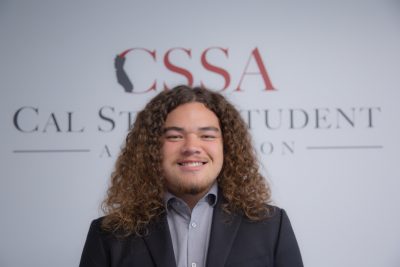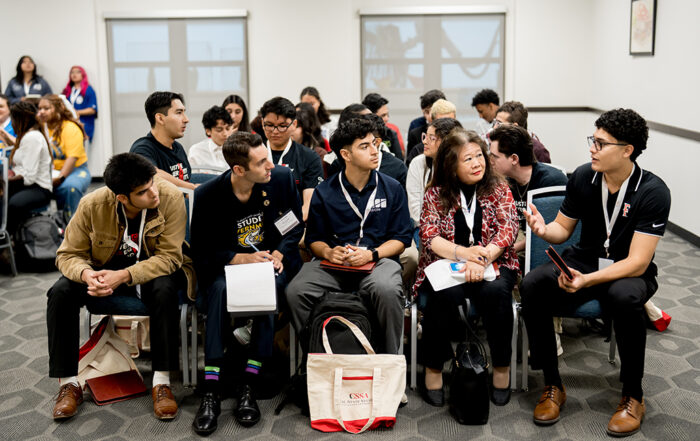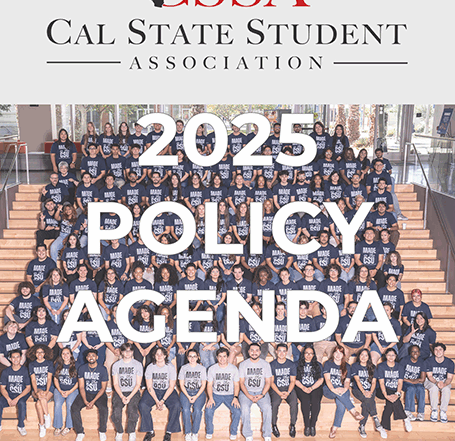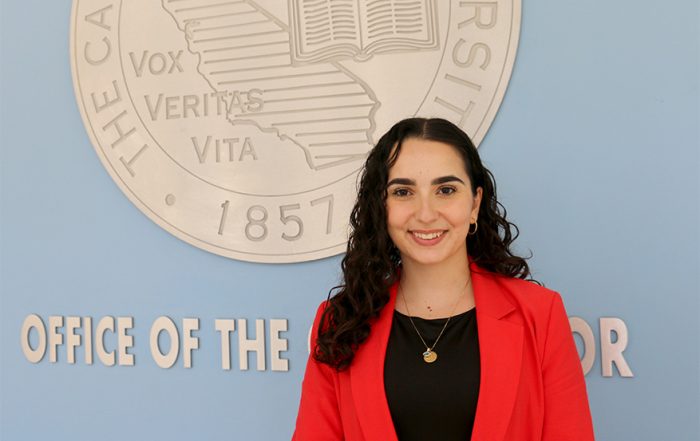
CSSA President Quan Treseler’s report to the CSU Board of Trustees
September 21, 2023
Thank you, Chair Fong and good afternoon Trustees, university Presidents, Chancellor Koester, and guests. My name is Dominic Quan Treseler and I serve as President of the Cal State Student Association.
CSSA represents the nearly half a million students in the CSU and serves as the official voice of CSU students to the California State Legislature and the CSU Board of Trustees. It is an honor to provide this report on their behalf.
Since my last report to you, CSSA convened for two plenaries in August and September. During our plenaries, our Board continued with the development of our 2024 policy agenda which will outline our organization’s priorities for next year. While we are still in robust discussions, there are consistent themes and issues that our students are very passionate about which include: tuition, debt and the total cost of attendance. Through constructive and spirited discussions, we delved into the major subjects stemming from the July Board of Trustees meeting, grappling with the pressing issues students face as they usher in the fall semester, all while laying the groundwork for revising our organizational policies.
Also in August, CSSA hosted the 11th annual CSUnity conference at Dominguez Hills. This conference is an opportunity for students to gather and learn about system wide policies and issues and identify ways in which they can be advocates on their campus.
Our event was attended by over 160 CSU students representing all 23 of the CSU campuses. The students were able to deepen their understanding of systemwide policies and how their experiences, stories, and backgrounds can help influence how they advocate.
This gathering facilitated meaningful dialogue, encouraging students to engage in breakout sessions with pivotal CSU stakeholders such as ASCSU, CFA, CSUEU, and the Chancellor’s Office. Students were also able to address salient issues facing the CSU such as: Basic needs, Title IX, Black student success and GI 2025. I’d like to thank all of our guest speakers who took time from their Sunday afternoons to spend with our students and for sharing their insight and expertise. The rich interactions and stories shared by our speakers underscored the depth of experiences within the CSU student body.
CSUnity concluded with an in-depth analysis of the multi-year tuition proposal, followed by roundtable discussions that enabled students to voice their experiences. We thank Assistant Vice Chancellor Ryan Storm and Executive Budget Director Jeni Kitchell for their willingness to present the tuition proposal, and speaking with students to enrich their understanding of the daily challenges faced by CSU students statewide.
I want to express my heartfelt gratitude to Chancellor Koester for braving the distance to be with us despite personal commitments, and for sharing insights that struck a chord with many. The Interim Chancellor and I have had many difficult candid conversations, but through it all she has never wavered in her engagement with our students. The rapport developed between the Chancellor’s Office and CSSA during your term has been instrumental, and we fervently hope to continue this level of engagement with Chancellor-select Garcia.
I extend my special thanks to University President Parham, ASI President Edgar Mejia-Alezano, the ASI officers, and Dominguez Hills staff for their warm hospitality. It was a pleasure to see all of the new buildings at CSUDH and hear of the wonderful plans to further students’ success. We look forward to our next in person gathering at Maritime in November!
Last Thursday, CSSA in collaboration with The Institute for College Access and Success unveiled a report titled, “CSU at All Costs: The Inequitable Burdens of Affording a College Degree.” Our findings underscore the multifaceted challenges confronting our students, namely, the total cost of attendance. This report, coupled with the Campaign for College Opportunity’s analysis of ongoing equity gaps in the system, emphasizes the pressing need for the CSU to address the concerns of our underrepresented minority students more robustly.
Our research underscores that while tuition is undeniably a significant expense, numerous additional costs tied with the pursuit of a degree present significant financial challenges. On average, our students grapple with annual expenses exceeding $20,000, factoring in food, housing, books, transportation, and other life essentials. Alarmingly, we also found that over 60% of our students that have annual family incomes of no greater than $54,000, and 44% of those have an annual family incomes of $27,000 or less, will leave college with significant debt. This means that many of our CSU families are shouldering the costs of housing, transportation and food with hourly wages of no more than 14 dollars and 12 cents
Beyond the rigor of full time studies, where as students we are anticipated to dedicate 40 hours weekly to academics, we are working on average more than 20 hours a week, and in many regions in the state, 30. With the proposed tuition hike, students will find themselves clocking an extra 3-4 hours at work each week. In this room, I have consistently heard the CSU compared to private corporations, however, there is not a business in this country that would say they expect this level of consistent commitment from its workers let alone its clients. Given those numbers, it is safe to say that even though the tuition increase has been spoken of as a modest, insignificant sum – it is not, it will continuously suffocate and impede the success of our students and this system.
Numerous studies have shown that balancing such work hours, while attending classes full time, greatly impacts academic performance, mental well-being, and diminishes the overall college experience. The immediate concerns of procuring food, shelter, and essential study materials like books, laptops, and stationery overshadow what should be a student’s primary focus: academic success. In truth, this burden stands not only as a significant barrier to academic achievement, but as a hindrance to breaking the cycle of generational stagnation, and is a challenge to uplifting communities that are historically marginalized.
I recognize the challenges the CSU faces, the looming deficits, the need to fairly pay the staff and faculty that serve faithfully, and the tough road ahead. Yet, while the CSU may feel compelled to make difficult decisions to persevere, its core mission remains indispensable for its continued existence – to offer an accessible affordable road to success to every Californian.
It is important to further contextualize the implications of the findings of the study within the conversation around increasing tuition. From our research, we know that 2 out of 3 Black students take on student debt and on average borrow more than their academic counterparts. Black CSU graduates on average are graduating with 76% more student debt than white CSU graduates (Pause), the impact of an increase will decimate the Black student population across our system. We know that systemic racism has marginalized these communities, often resulting in a diminished capacity to cover the total cost of attendance. We know that this often means higher loan amounts. We also know that graduating with significant debt can limit opportunities – from buying a home, pursuing certain careers or starting a business. And we also know that the weight of this debt can block the path to upward mobility, reinforce barriers, and cause the economic disparities we are trying to dismantle, to persist generation after generation.
Earlier at public comment, you heard from Associated Student leaders from 21 of our 23 campuses who joined the chorus of students who spoke today. The narratives you heard encapsulate the essence and legacy of the CSU. They are echoing the research that we have done and that should always be prioritized before decisions such as these are made. Those student leaders are the collective voices of our nearly half a million CSU students and the echoing chorus of those voices are pleading with you now.
While we appreciate the efforts of many of our administrators to work to increase the support students receive from this increase, the CSSA continues to stand in strong opposition to anything that would stand as a barrier for our students to access the life changing power of a college degree.
While we believe the changes made are commendable, they are foundational and were always expected as the baseline, especially when considering a tuition hike.
We appreciate the readiness to listen and implement modifications. Yet, it took weeks of vocal opposition against the concept of an indefinite increase before it was recognized and rectified. After months of highlighting the potential impacts of this increase on the very fabric of our system, we hope that our valid concerns will be addressed today and tomorrow. These short-term revenue gains must be balanced against the compounded financial and emotional strain placed on our students.
I have had the opportunity to meet with people from across this system – from our dedicated faculty in the Academic Senate, to our incredibly astute administrators in the chancellor’s office, and to the compassionate trustees seated in front of me right now. I know that every person who works for this system has its best interests at heart. Yet, please consider the timing of this proposal: you cannot tell me that there would not be twice as many people protesting outside those doors if class had not started just 3 weeks ago. (Pause) You cannot tell me there would not have been 3 times as many people at public comment if this proposal was not announced only 2 months ago. With such factors in play, and as you’ve heard today it’s impossible for CSU students to fully trust that their interests are at the forefront and that their voice is important, especially when juxtaposed against a financially crushing tuition hike and a new Chancellor’s substantial compensation package of over 1 million dollars.
We must ensure that the dream and reality of a CSU education and its transformational impact is not yet another dream deferred for the students in our system. We must not fail in our mission to ensure accessibility and affordability of a degree to our students.
We urge the CSU Board of Trustees to take our concerns, requests and our pleas into serious consideration. I truly believe that together, we can mold a future where every deserving student can access, afford, and thrive in the CSU system. Your discernment on this matter holds the promise of shaping a balanced, inclusive future for our institution. Let’s champion the cause of our students, ensuring their well-being and success remain at the forefront of our decisions.
Thank you for your time and I sincerely hope you listen to the almost half a million students and consider our futures.



